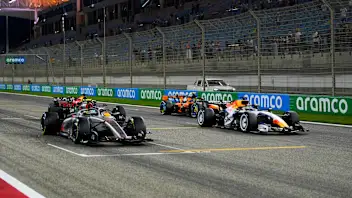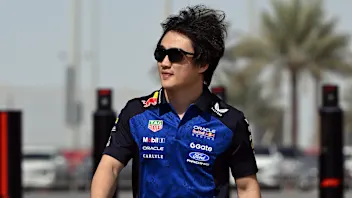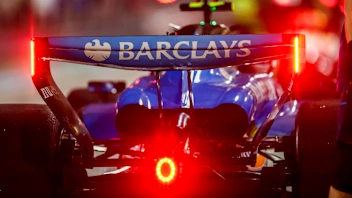Susie Wolff made history at Silverstone earlier this year when she became the first female driver to participate in an official Grand Prix session since 1992 - a landmark she followed up on with an accomplished showing at Hockenheim, where she was just two-tenths slower than Williams team mate Felipe Massa.
Wolff may be breaking down stereotypes - and inspiring a new generation of female racers - but insists it is her performance, rather than her gender, on which she must be judged...
Q: Susie, is driving a Formula One car better than driving anything else in the world? And is there a female view to it?
Susie Wolff: I don't think that there is a male or female perspective on driving a Formula One car - only a driver's perspective. It is the most technically advanced car in the world. You really have to adapt very quickly in your mind because everything happens so fast - and the performance is almost more than you can comprehend. Once you've come to terms with it, it is an overwhelming feeling to drive such a car.
Q: Where does your technical understanding come from? Modern F1 cars are more complex than ever before…
SW: Don't forget, I started racing on four wheels when I was only eight-years old. I had my first motorbike when I was two - so you already start to develop the kind of coordination skills that you need at high speed from very early on. So looking at it, I started racing at the same age as all those guys on the grid. At that age you don't think about career, you just do what you enjoy - and of course even at that age there is the ambition to be successful. Looking back I was very lucky to live my passion and carry it into a career. When I was a kid I didn't think that I was doing something unusual for a girl. My parents were very good in not making me believe that I was doing something unusual - so I was able to live my passion without reflecting on any boy or girl matters. When I was 13 it clicked in my head that racing could be a career, and that eventually I could make it to Formula One.
Q: After racing against the likes of Lewis Hamilton, Robert Kubica, Kimi Raikkonen or Nico Rosberg in karting when you were younger, have there been some moments when you believed there is a gender issue attached to the top categories of racing? They all made it into F1 racing in their early twenties while you're still in the hunt for a race drive…
SW: There have been some funny moments, yes. I remember the world championships in Portugal when I finished 15th overall - and after the final I was quite happy finishing 15th as the last race was really tough and I delivered a good finish. The podium ceremony was going on when suddenly there was the call, ‘Susie Stoddart, please come to the ceremony'. I thought that's very strange because I haven't finished in the top three, but my team manager said I had better run quickly… they called me up to the podium for being the top female driver! And I remember thinking I am not here to be the top female driver - I am here to be the best driver. That's when it dawned on me that there might be something to it.
Q: So why are Formula One teams so reluctant when it comes to female drivers?
SW: I wouldn't say that they are reluctant. They are just very performance based - and there haven't been enough females on the right level to be given a chance. And there are some people in the paddock who are against it anyway. Well, they can stay against it, but sooner or later it will happen and they will have to accept it. The paddock is a bit of a shark pool - and there will always be people who are against female F1 drivers.
Q: How good was it then to show in your FP1 outings, especially at Hockenheim, that you can go against the guys and beat quite a number of them?
SW: I was never out there to get a good position on the time sheet - it was always my goal to get as close as possible to my team mate…
Q: But this is a time sheet-driven sport…
SW: Yes, that's true. I rate Felipe very highly so I knew from a team perspective that I had to tick four boxes: I had to do a good job; bring the car back in one piece; collect good data; and get as close to Felipe as possible. And I did tick all four! I was very pleased with my performance. I always said that I wouldn't be doing this if I thought that I was not good enough. I am a very realistic person and if I thought I wasn't capable I wouldn't put myself in such a position. I had done a lot of work to get ready for Friday morning. And it was a real solid performance.
Q: Indeed, it was the sort of performance that could in theory translate into a permanent drive. Is there a chance we could see you racing a Formula One car in 2015?
SW: At Williams we have two good drivers, so it would be difficult…
Q: But there are 11 F1 teams, which means a potential 22 drives…
SW: I am very proud to be with the Williams team. They've given me the chance to test an F1 car when nobody else was interested because I didn't show enough performance in DTM. So I am proud to be with this team - and see how they are turning everything around right now! I want to stay here and see what chances come my way. I know that I have to fight hard for it.
Q: It was a bit of an eye-opener that it was Williams that gave you the chance - a very traditional team with a focus on real racers in their cockpits…
SW: It is so nice that you say that, because so many people said that this is just a marketing scheme. But Sir Frank Williams would never put someone in his car if he didn't believe that they are good enough. Frank came up to me after the sessions and said that he was really happy with my performance. Frank and [deputy team principal] Claire [Williams] - this is a racing team! So I know when I'm not good enough I'm out, because my performance counts more than my gender does. They gave me the chance and we can be proud that we have achieved something special together.
Q: It is human nature to want more? When will occasional Friday outings no longer be enough for you?
SW: I have to fight for more - and hope that more is possible. I am a great believer that if you keep knocking at doors then eventually one will open - and then I have to be ready for the opportunity when it comes. It was a big step forward to do a good job in the free practice sessions. Now it is for me to carry on and hope that other opportunities come.
Q: In recent decades women have established themselves in so many areas once deemed male domains. Why hasn't it happened in F1 racing? Why is it taking so long?
SW: Firstly I would say that there are no real role models for girls to aspire to be in F1. That leads straight to the second issue: if you don't get enough young girls karting, you don't get the best rising to the top. But I am convinced that the problem is going to solve itself: Claire Williams is a role model, I am a role model - so we show that it is possible, and that will inspire more to follow. It is not enough to just be a woman: you have to be good!
Q: How sad are you that your F1 career seems to be just starting at 31 when others are making their race debuts as teenagers?
SW: I can honestly say that I would have never been ready for this opportunity at let's say 19. I had seven fantastic years at Mercedes-Benz in DTM - and that made me into a very tough racing driver. I didn't have the success I wanted to have and have to admit that DTM was a tough time for me. I never got into the A-team to have a real chance and fight for podiums, but that hardened me as a driver. I had fantastic team mates I could learn from - Mika Hakkinen, Jean Alesi and Ralf Schumacher - and all these experiences brought me to where I am now. Had I not had that experience I honestly believe that my first outing with an F1 car in 2012 would never have been so positive, and it would have never led me to this chance now. It was a one-off test back then that Frank Williams gave me - and that was all it was supposed to be - but because it went well it led to another young driver test. That also went well, and led to Barcelona this year, and so on and so forth. If I hadn't been good at every step I would have been out immediately. So you could say that it is a bit sad that I am over 30 years-old now, but as I said before I wouldn't have been ready at 19 - so it isn't sad at all! I once sat at a dinner next to [Olympic gold medallist cyclist] Sir Chris Hoy and he said that people have been asking him since he was 28 when he will retire - but he said, ‘my biggest success came in my mid-thirties, as all the experience I had helped me to win gold'. I take that as an inspiration. And I am convinced that I will know when my time is up - I am not one of these people that hang on to the last tiny opportunity. If I see that it can't go further I will be the first to say it.
Q: You've had that first rush of success in an F1 car. Do you feel that there is more to come?
SW: Yes. I feel I have a lot to achieve.
Q: So what elements have to come together to let your potential bloom?
SW: It almost reduces to one thing: time in the car. And that is a bit tricky, as testing is limited and the regular drivers need the mileage. So how do I get more time in the car? That's the biggest hurdle that I have to overcome.
Q: Today's drivers are ideally small and light. You would fit the bill perfectly - and you've shown that you can perform…
SW: Actually yes, I should fit the bill! I have been speaking with some of the drivers who have been in F1 for quite a while and all said that F1 cars were really tough to drive in around 2006 - but today all the progress is heading in my direction. The cars are getting easier to drive - okay, I would never say that F1 cars are easy to drive, but it is getting easier. Yes, you have to be small, you have to be light, so that is why I believe I still have a lot to give.
Q: What advice would you give to girls wanting to follow in your footsteps?
SW: Go for it! Don't let anything stop you from going for it. The good things in life are always hard to get, but if you really want it you will succeed no matter how many tough days there are along the road. Ride the wave in a world that is changing for the advantage of women.
Q: What about the bad hair days when taking off the helmet?
SW: Yes, it's a bad hair day every time I take off the helmet. I can judge how bad a hair day it is by looking at my engineer - if he is shaking his head I know it's time to put on a cap immediately! (laughs)
Next Up
Related Articles
 POLL: Who impressed you the most in pre-season testing?
POLL: Who impressed you the most in pre-season testing? BettingF1 betting odds catching the eye after second test
BettingF1 betting odds catching the eye after second test UnlockedPredict the Australian GP Winner for a chance to win
UnlockedPredict the Australian GP Winner for a chance to win.webp) ExclusiveThe Audi prospect making waves in single-seater racing
ExclusiveThe Audi prospect making waves in single-seater racing Who are the reserve drivers for each F1 team in 2026?
Who are the reserve drivers for each F1 team in 2026? What do the new lights on F1 cars mean?
What do the new lights on F1 cars mean?